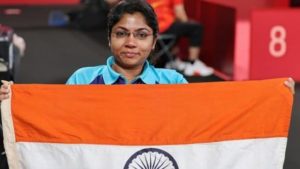
Seconds after losing the women’s singles table tennis Class 4 final at the Tokyo Paralympics on Sunday, Bhavina Patel was beaming. The Indian had lost to world No. 1 Chinese Zhou Ying, now a six-time Paralympics champion, 3-0 (7-11, 5-11, 6-11), but a historic silver had been won. Patel greeted that medal with a kiss—never mind the mask—on the podium. ‘It hasn’t been out my sight since then,’ Patel said.
It was the first medal won by an Indian at the Tokyo Paralympics, a first by an Indian paddler and only the second by an Indian woman at a Paralympics. The world No. 12 punched above her weight, only losing to Zhou in her first match and final, and beating four higher-ranked players, including the defending champion Borislava Peric-Rankovic of Serbia.
In a chat with HT, the 34-year-old from Gujarat, confined to a wheelchair from the age of one after suffering from polio, talks about the stellar show in Tokyo and how table tennis has become a integral part of her life.
Excerpts:
Before coming to Tokyo, did you expect to win silver and share the podium with the Chinese paddlers?
I fully expected to do this. I came here with the mindset of giving 100 per cent in every game, irrespective of the opponent or her country.
You beat four higher-ranked players on the way to the final. What do you put your performance down to?
Hard work, more than anything else. I’ve been focused only on this for a long time. I visualised myself being here. Then came the skill part, which my coach (Lalan Doshi) and I worked tirelessly on—be it on technical aspects or working on different tactics against different players. All of this has resulted in the kind of performance I managed to put out here.
Your coach believes determination and self-belief are auto-processed in you. Where does it come from?
A lot of it comes from my focus on mental work. I meditate a lot, do a lot of yoga. It’s a big part of my training routine, and that goes a long way in me having a positive frame of mind most times.
You moved to the Blind People’s Association in Ahmedabad from your home in Vadnagar after school. How important was that decision?
It was one of the biggest, and the most important. I had to almost start a new life, which led me to my journey into table tennis. From there, it has only grown. Table tennis is my oxygen, it lets me breathe. I can’t imagine my life without table tennis. If I don’t play table tennis for even a day, I don’t like the taste of my food, I don’t get sound sleep, I feel like an entire day has been wasted. That’s how I feel without the sport now.
You first played TT in the association for leisure. When did you start believing that you could compete professionally?
It was around 2004-05 that I first played table tennis in BPA. I would watch my friends play and I too got the urge to start playing. It was just for fun, nothing else. That turned into a passion within a few years. That passion has got me here today.
You missed out on the 2016 Rio Paralympics (Patel was ranked world No. 13 and the top 12 qualified). How did you overcome that disappointment?
I have a philosophy—I never look back, whatever it may be. Whatever happens, it is for a reason. I always want to look ahead.
So, how much change do you believe this medal will bring about for you?
A massive change, not just in my table tennis career but life in general. I’m starting to witness the change already. I have never spoken to so many people after a tournament before. That shows how great this is for me.
What is your next target?
The Asian Para Games next year. There’s no time to rest or sit back on this achievement. The entire process will begin again for me after I return. My daily training routine, my hours of hard work to further improve my game—all of that will start again immediately.
But you can afford to celebrate a little.
Maybe for a week; not more than that.




 Driving Naari Programme launched in Chandigarh
Driving Naari Programme launched in Chandigarh






























